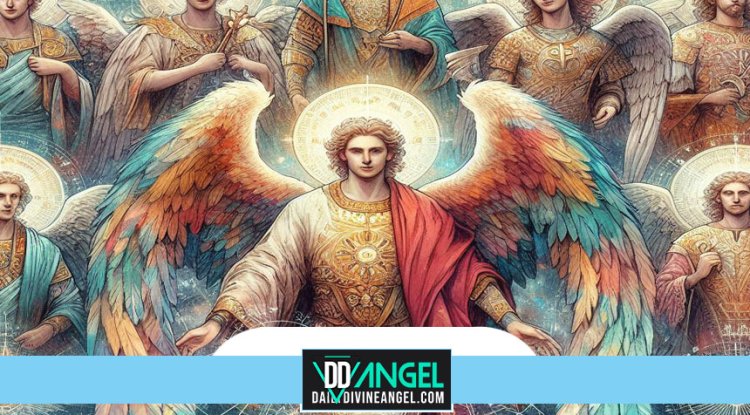How to Incorporate Archangelic Beliefs into Your Life
Creation to Archangelic beliefs - Some non-secular corporations and groups contain archangelic worship, rituals, and prayers as principal components of their practices.

Archangelic beliefs have long been respected and embraced in diverse cultures across the globe. Those celestial beings, believed to be divine messengers and protectors, hold a considerable place in cultural ideals and practices. From historical civilizations to trendy spiritual moves, archangels have played a pivotal role in shaping cultural mythology, values, and rituals. This newsletter explores the diverse manifestations of archangelic ideals, their function in specific cultures, and the impact they exert on cultural identification and team spirit. By delving into the historical origins, modern interpretations, and importance archangelic beliefs maintain for people and societies, we gain a deeper understanding of the profound impact those celestial beings have had on the human way of life throughout records.
Archangelic beliefs in Cultural beliefs and Practices
introduction to Archangelic beliefs
Defining Archangelic beliefs
When it comes to celestial beings, archangels are just like the rockstars of the heavenly realm. They're acknowledged for their mammoth strength, information, and function as intermediaries between humans and the divine. Archangelic ideals embody the characteristics and attributes associated with those celestial figures, such as bravery, safety, guidance, and divine intervention.
The historical Origins of Archangels beliefs
Archangelic ideals have deep roots in diverse historical civilizations and religions. From Mesopotamia to Egypt and Norse mythology to Japanese religions, the idea of archangels has been a necessary part of cultural and religious narratives. These beliefs have advanced and been tailored through the years, shaping our understanding of those celestial beings and their importance in human existence.
Archangelic ideals in one of the Cultures
Archangelic ideals in ancient Mesopotamia
In historic Mesopotamia, archangelic beliefs were embodied in deities, which included Marduk, Ninurta, and Nabu. These powerful beings have been revered for their roles as divine warriors, protectors, and sources of awareness. They had been believed to champion truth over evil and to guide humanity in the direction of righteousness.
Archangelic ideals in historical Egypt
In ancient Egypt, archangelic ideals were personified in deities along with Thoth, Ma'at, and Horus. Thoth, the god of expertise, was seen as a divine mediator and a protector of understanding. Ma'at represented the concepts of stability and justice, while Horus became revered as a celestial falcon associated with divine kingship and safety.
Archangelic ideals in Norse Mythology
Norse mythology delivered a pantheon of powerful beings referred to as the Aesir, which blanketed figures like Odin, Thor, and Freyja. Those gods embodied archangelic ideals through their battles against giants and other malevolent forces, their protection of humanity, and their expertise and steerage in times of need.
Archangelic ideals in Japanese religions
Eastern religions consisting of Hinduism, Buddhism, and Taoism additionally comprise archangelic ideals. In Hinduism, deities like Vishnu, Shiva, and Brahma are taken into consideration as archangelic figures, embodying divine attributes and appearing as protectors and publications. In Buddhism, Bodhisattvas like Avalokiteshvara and Manjushri play a similar role, imparting compassion, awareness, and assistance to humanity. Taoism, too, reveres celestial beings referred to as immortals or xian, who own archangelic traits and guide seekers on their religious paths.
The Function of Archangels in Cultural Mythology
Archangels as Divine Messengers and Protectors
One commonplace role of archangels throughout cultures is that of divine messengers. They may be frequently dispatched via the divine to supply important messages, provide guidance, and defend humanity from harm. They act as intermediaries between the mortal realm and the divine realm, bridging the distance and ensuring the well-being of humanity.
Archangels as Intermediaries between human beings and the Divine
Archangels serve as conduits among human beings and the divine, allowing communication and connection to take place. They're believed to facilitate prayers, rituals, and devotional practices, making sure that human appeals reach the divine and that divine advantages and interventions reach humanity. Their presence affords comfort, reassurance, and an experience of divine help in times of need.
Archangelic Practices and Rituals throughout Cultures
Invocation and Prayer to Archangels
Across cultures, invoking and praying to archangels is a common exercise to seek their guidance, protection, and assistance. humans name upon these celestial beings through prayers, chants, and rituals, expressing their dreams, in search of steering, and inquiring for divine intervention in their lives.
offerings and Devotions to Archangels
Offerings and devotions to archangels are every other way human beings express their reverence and try to find a reference to these celestial beings. Offerings can also encompass candles, incense, plant life, or specific objects associated with the archangels. Those acts of devotion signify respect, gratitude, and a choice for a deeper connection with the archangelic realm.
Archangelic healing and safety Rituals
Archangelic restoration and safety rituals involve invoking the archangels' recuperation energies and seeking their intercession for physical, emotional, and spiritual well-being. Those rituals regularly include meditation, visualization, and using unique symbols or crystals associated with specific archangels. Through these practices, individuals wish to receive support, restoration, and divine protection.
So, whether or not you're seeking guidance, safety, or a religious connection, archangelic ideals and practices offer a rich tapestry of beliefs and rituals across various cultures. Embracing these celestial beings can bring an experience of consolation, a concept, and a deeper understanding of our place inside the cosmos.
Archangelic beliefs and their impact on Cultural Values
Archangels and concepts of Justice and Harmony
Archangels have long been associated with concepts of justice and harmony in numerous cultural ideals and practices. Throughout distinct traditions, archangels are often portrayed as divine beings who maintain order and fairness in the world. They are visible as upholders of justice, making sure that stability is restored and maintained in each bodily and spiritual nation-state. These archangelic ideals of justice and concord have a profound affect on cultural values, shaping the moral compass of societies and guiding individuals in the direction of righteous moves.
Archangels and Spiritual Transformation
The other massive issue with archangelic beliefs is their connection to spiritual transformation. In lots of cultural beliefs, archangels are considered religious guides and mentors who assist individuals in their journey of self-discovery and personal growth. These celestial beings are seen as sources of notion, presenting guidance, safety, and encouragement to those looking for non-secular enlightenment. The notion of archangels as catalysts for transformation encourages people to embrace introspection and self-development, ultimately leading to a deeper knowledge of themselves and their region globally.
Modern-day interpretations and diversifications of Archangelic ideals
New Age Movements and Archangelic Teachings
In modern instances, archangelic beliefs have determined new expressions through various religious moves, mainly within the realm of recent-age spirituality. New Age practitioners often incorporate archangelic teachings into their practices in search of guidance and aid from those angelic beings. The emphasis on personal empowerment and self-recuperation in New Age actions aligns with the archangelic ideals of transformation and non-secular growth, making them a natural healthy within this contemporary context.
Archangels in Famous Lifestyle and Media
Archangelic ideals have additionally permeated famous subcultures and media, achieving audiences on an international scale. Archangels, portrayed as effective and heroic figures, have emerged every day in literature, films, and TV shows. Their depiction frequently mirrors the archetypal features of justice, strength, and benevolence. Through those mediums, archangels encourage and captivate audiences, sparking interest and hobbies in their cultural and spiritual significance.
Archangelic beliefs in contemporary non-secular movements
Archangelic beliefs in New non-secular moves
Archangelic beliefs have also discovered their region in various new spiritual movements that have emerged in recent times. Some non-secular corporations and groups contain archangelic worship, rituals, and prayers as principal components of their practices. The archangelic beliefs of justice, harmony, and transformation resonate with people in search of religious achievement and a deeper connection with divine energies.
Archangelic Influences in Angelic Channeling and Mediumship
Furthermore, archangels play a widespread role in angelic channeling and mediumship. Practitioners who communicate with angels regularly invoke the presence of archangels for the duration of their classes, believing that these celestial beings own knowledge and steer beyond human information. Archangelic effects in these spiritual practices offer a sense of comfort and warranty, fostering a connection between the fabric and non-secular geographical regions.
The significance of Archangelic ideals in Cultural identity and harmony
Archangels as Symbols of countrywide or local identification
Archangelic beliefs can also function as symbols of national or local identification. In some cultures, archangels are considered customer saints or protectors of specific cities or countries. These beliefs create a sense of cultural satisfaction and team spirit as communities rally around their shared notion of the divine guardianship of their hometown. Archangels become revered figures that encompass the collective identity and values of a particular group.
Archangels and Interfaith communicate
Ultimately, archangelic beliefs can play a role in selling interfaith talk and information. As archangels are present in diverse cultural and spiritual traditions, their taking a look at and contemplation can act as a not unusual ground for individuals of various faiths. Exploring archangelic ideals across cultures fosters conversations and mutual appreciation, highlighting the shared desire for justice, concord, and spiritual increase that transcends religious boundaries. In conclusion, archangelic ideals go beyond cultural boundaries and retain human creativity. The belief in these celestial beings remains a vital part of cultural practices and mythology, whether in historic civilizations or cutting-edge non-secular movements. The iconic presence of archangels serves as a reminder of our innate preference for connection with the divine and the profound effect that spiritual beliefs have on shaping our cultural identities. As we explore and appreciate the various expressions of archangelic ideals, we gain a deeper appreciation for the richness and intensity of human perception structures. Ultimately, archangelic beliefs stand as a testament to the iconic power of religion, mythology, and the human quest for transcendence.
FAQ
Are archangelic beliefs and practices constrained to particular religions?
Can archangelic ideals be discovered in modern secular societies?
How do archangelic beliefs affect cultural values and norms?
Are there any scientific or historical proofs helping the lives of archangels?
What's Your Reaction?




















